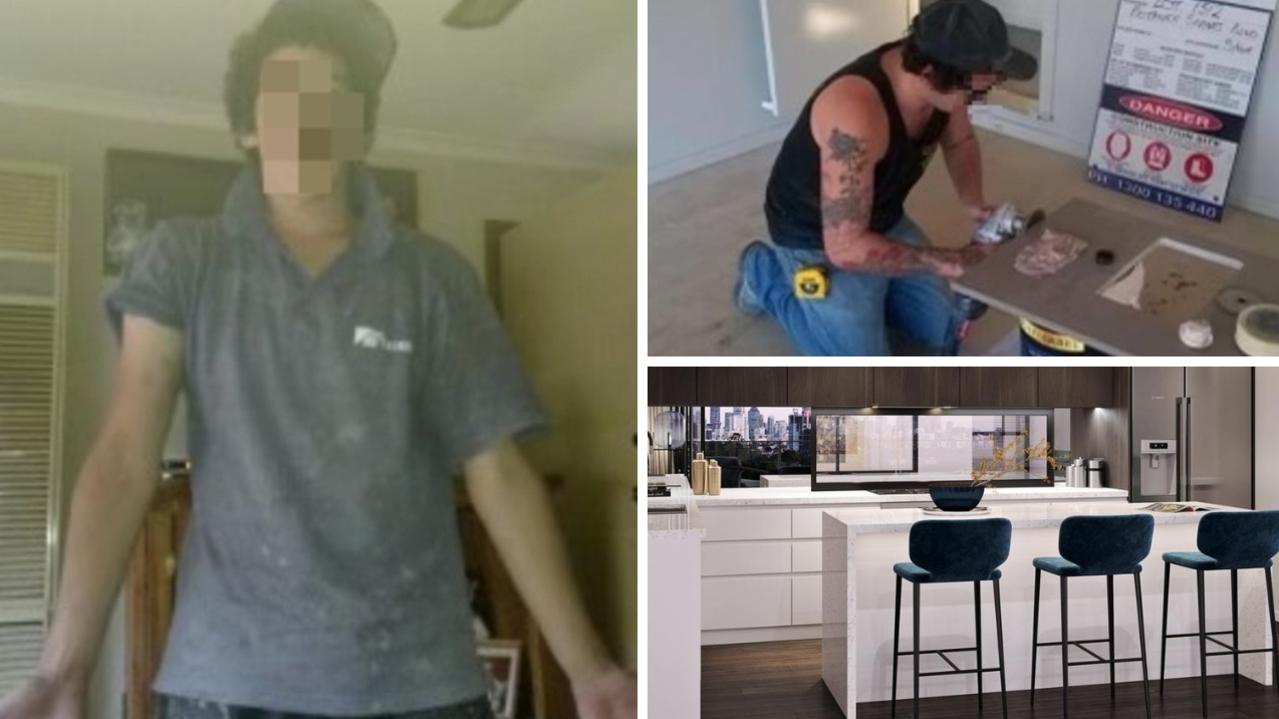Safe Work Australia has called for a total ban on engineered stone, as tradies die with horrific illnesses caused by cutting the product — but the government says it won’t make any changes until it decides on a “national response”.
Engineered stone is a marble- and granite-alternative that’s hugely popular in renovations and new builds. It has been linked to a devastating health epidemic due to its high silica content.
The most common illness is silicosis, an incurable lung condition that can kill. Irreversible symptoms, including a persistent cough, shortness of breath and difficulty breathing, can appear from a few weeks to many years after exposure to silica dust.
Safe Work Australia was asked by the government to look at possible solutions to the crisis.
On Friday, it announced that a total ban was the only option and accused regulators of failing to protect workers from the deadly and debilitating disease.
“Continued work with engineered stone poses an unacceptable risk to workers,” the report said.
“The use of all engineered stone should be prohibited.”
“There is no scientific evidence for a ‘safe’ threshold of crystalline silica content in engineered stone,” it added.
Workplace relations minister Tony Burke, who himself commissioned the report, called it “compelling” but said no decisions will be made until later this year.
“The final report is powerful and compelling. It shows very clearly why we need further action to protect workers from this deadly disease,” Mr Burke said.
Mr Burke said he will meet with his state and territory counterparts later this year to decide on next steps.
‘More deaths will come’
Meanwhile, more than a quarter of a million tradies are at risk of developing silicosis. Many have already been diagnosed and some have died.
Father of two Tristan Wilson worked as a stonemason for five years before he was diagnosed with silicosis and told he will need a lung transplant.
“Are they waiting for more people to get sick? Are they waiting for death to start happening … for the bodies to start coming in?” Mr Wilson told the ABC.
“Because it’s going to happen.”
Earlier this year, news.com.au spoke with Nathan Donnelly, a Victorian dad suffering silicosis.
Mr Donnelly received his diagnosis after a 15-year career installing kitchen benchtops, and said he was hardly warned of the dangers.
Sharing a series of troubling images of young tradies on worksites working with the deadly products without PPE, he stated a “hazmat suit and quarantine” would be the only way to deal with the products safely.
“As soon as you remove the mask, the dust is all over your face,” he told this publication.
“I was going home at night covered in dust. It was in my car, in my clothes. I was bringing it home to my kids.”
Last year, Curtin University estimated more than 275,000 workers, primarily tradies, were exposed to high levels of the carcinogenic dust.
The study predicted that up to 103,000 labourers would be diagnosed with silicosis.
The Royal Australian College of GPs states those diagnosed with silicosis “lose an average 11.6 years of life”.
‘Industrial manslaughter’: Tradies take ban into own hands
Earlier this week, the Australian Council of Trade Unions (ACTU) confirmed it will ban engineered stone from entering worksites from July 2024 if a national ban is still not in place.
ACTU Assistant Secretary Liam O’Brien described the crisis as “possibly one of the greatest tragedies since asbestos”.
“What we are seeing is workers in their twenties and thirties being struck down with a disease that has no cure, is debilitating, and in some cases will be fatal,” he said.
Graeme Edwards, an occupational physician and member of the former National Dust Disease Taskforce, said he believed the government should have announced a national ban on Friday, given the dangers of engineered stone have been apparent for years.
“Abdicating their responsibility to make that judgement call is tantamount to industrial manslaughter,” he said.
“Every day that these workers continue to do the job that they’re employed to do, it’s going to expose them to all of this harm and they will die. They will die a painful, distressing, premature death.”
Queensland industrial relations minister Grace Grace said a final decision on a ban may come this year, but stopped short of confirmation.
“We agreed that we will get together before the end of the year, hopefully in December, and that at that meeting we will make a final decision for a consistent approach,” she said.
